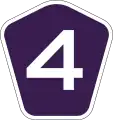Road classification
Route numbers
The ACT generally does not number its highway and freeway grade roads; those that are numbered, are interstate highways and their connecting roads. The ACT is preparing to introduce the NSW alpha-numeric route system for these thoroughfares. The new system will be implemented in 2013 at the same time as NSW completes its own transition to alphanumeric numbering.[1]
Road hierarchy
The ACT classifies its roads into four groups, depending on its physical properties and role within the road network:[2]
Arterial roads
These roads serve long distance travellers within or between districts, and support large volumes of traffic. They may be limited access, or controlled-access. A small number of these roads have relatively high levels of property access due to city design requirements at the time.
Major collector roads
These roads serve local area traffic distributing to or from minor collector roads, and also link to the arterial network. Well designed property access is permissible.
Minor collector roads
These roads serve neighbourhood traffic, and provide access from the major collector roads into residential areas. Normal direct property access is permissible at this level. Secondary links to the arterial network are possible.
Access streets
These streets are the lowest road type in the hierarchy, and provide access to the bulk of residential homes.
List of major roadways in the ACT
Controlled-access roads
Controlled-access roads in the ACT are often known as parkways either by name, or at some stage during their development, these generally (but not always) travel through peripheral areas between urbanised regions.
 Majura Parkway
Majura Parkway- Gungahlin Drive Extension – John Dedman Parkway during planning stage
- Capital Circle
- Parkes Way* – controlled-access western extension known as the Molonglo Parkway during planning stage
- Tuggeranong Parkway
 Adelaide Avenue
Adelaide Avenue- Yarra Glen – Woden Parkway during planning stage
*Partially limited-access
Limited-access roads
- Athllon Drive
- Barry Drive
 Barton Highway
Barton Highway- Belconnen Way

 Canberra Avenue[3]
Canberra Avenue[3] Commonwealth Avenue
Commonwealth Avenue- Constitution Avenue
- Drakeford Drive
- Fairbairn Avenue
 Federal Highway
Federal Highway- Ginninderra Drive
- Gungahlin Drive
- Hindmarsh Drive
- Isabella Drive
- Kings Avenue
 Kings Highway
Kings Highway- Limestone Avenue
- Majura Road

 Monaro Highway[3]^ – controlled-access northern extension known as the Eastern Parkway during planning stage
Monaro Highway[3]^ – controlled-access northern extension known as the Eastern Parkway during planning stage Northbourne Avenue
Northbourne Avenue State Circle
State Circle- Tharwa Drive
- William Hovell Drive
 Vernon Circle
Vernon Circle- Yamba Drive
^Partially controlled-access
Major Interchanges
Tourist Drives
The ACT previously had 7 colour coded and themed tourist drives explore the city and nearby bushland. While some signs remain, tourist drives have been officially decommissioned in the ACT.[3]
 Tourist Drive 1
Tourist Drive 1 Tourist Drive 2
Tourist Drive 2 Tourist Drive 3
Tourist Drive 3 Tourist Drive 4
Tourist Drive 4 Tourist Drive 5
Tourist Drive 5 Tourist Drive 6
Tourist Drive 6 Tourist Drive 7
Tourist Drive 7
Canberra is also the southern terminus of the Remembrance Driveway, which is a system of arboreal parks, plantations, and road-side rest areas dedicated to former and current members of the Australian Defence Force. There are also memorial parks and rest areas along the route which honour Australia's Victoria Cross recipients.
See also
- Highways in Australia for highways in other states and territories
- List of highways in Australia for roads named as highways, but not necessarily classified as highways
References
- ↑ "INFORMATION FOR SOUTHERN NSW & ACT". ALPHA NUMERIC ROUTE NUMBERS - A NEW ROAD NUMBERING SYSTEM. Government of New South Wales. 27 November 2012. Retrieved 24 February 2013.
- ↑ ACT Road Hierarchy - Justice and Community Safety Directorate, ACT Government, 21 August 2012
- 1 2 3 "Guide Signs MIS 12" (PDF). ACT Government. April 2019. pp. 13, 35. Retrieved 9 June 2020.